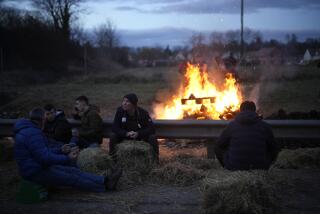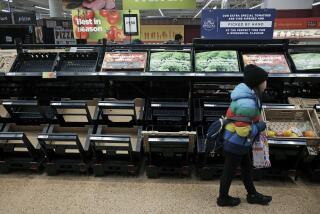The Taste of Europe Is Changing as Food Scares Keep On Coming
- Share via
REMAGEN, Germany — When Maria Bell-Becher decided to start an ostrich farm eight years ago, even her husband laughed.
What sense was there in producing a niche food in prosperous Europe, where the vast majority of gourmets and gourmands were hooked on red meat and potatoes?
But now her phone and her wrought-iron doorbell never stop ringing, as frantic restaurateurs, butchers and supermarket buyers seek something still considered safe amid the continent’s spiraling food panics.
Battered by successive scandals involving “mad cow” disease, foot-and-mouth sickness, false claims of “organic” eggs, radiation-treated produce and fish tainted by dioxin, many Europeans are changing their eating habits to embrace the exotic and eschew anything with even a whisper of risk.
Beef sales are down 80% in Greece, and the Italian Vegetarian Assn. reports a 100% increase in new memberships so far this year. Sales of ostrich--suddenly the rage for its low level of fat and cholesterol and invulnerability to livestock diseases--have risen 600% among the avid meat-eaters of Spain, and ostrich farmers can’t satisfy demand anywhere on the continent.
Rabbit, horse meat and pigeon, duck and every other sort of poultry are skyrocketing in price as chefs and homemakers scurry to replace the traditional roasts, steaks and sausages that usually grace their tables.
“You almost cannot find a duck these days in Europe,” lamented Herbert Beltle, chef and owner of the Aigner restaurant on Berlin’s trendy Gendarmenmarkt square.
Amid nightly images of burning sheep carcasses and stumbling, brain-wasted cattle, many are being put off their food altogether.
“This is a crisis for all of gastronomy,” said Bernd Paech, director of the Havelland Express gourmet wholesaler, which provides everything from baby greens to rabbit goulash for 700 hotels and restaurants in northern Germany. “Who feels like tucking into a nice meal after seeing all these poor slaughtered animals being poured out of dump trucks?”
Patrons of Europe’s best restaurants say they are distressed by the gruesome images and depressed by the disappearance of their old favorites. T-bone steak is now shunned for fear that mad cow disease, or BSE--bovine spongiform encephalopathy--is carried in bone marrow, and lamb roasts will be in short supply this Easter because of quarantines and transport bans imposed because of foot-and-mouth outbreaks.
“When I think about how I used to make soup stock from beef marrow, I just get sick,” said Marianne Wilhelms, a homemaker from the Rhine River town of Menden who says she has sworn off beef forever.
Adolfo Alcalde of the Spanish Assn. of Young Farmers agreed: “Watching images on television of brains being dissected in labs or of dead animals being shoveled up to be buried ruins your appetite.”
Although many suspect that the food fears are fleeting, imports of Kobe beef--the most expensive in the world at upward of $200 a pound--are rising as the most exclusive eateries seek to assure their customers that they are getting the safest ingredients. Almost every restaurant in Central Europe still serving steaks now boldly emblazons on its menu that only Argentine beef is used in the kitchen.
Some farmers have taken to feeding their cattle beer instead of hormones to produce more tender meat, or to massaging the animals for an hour a day to achieve better fat distribution, a recent issue of the German weekly Die Woche reported.
At a hillside farm in Remagen overlooking the Rhine River valley, Bell-Becher is busy fencing new fields and building shelters so that she can expand her ostrich herd from the current 200 a year for on-site slaughter to 500.
“I’m not only confident the demand will be steady, but I expect it to grow,” said the onetime apple farmer. Her adult sons are now keen on the ostrich business, and even her husband, an educator, concedes that she was farsighted.
The Organic Solution
Those who are turned off completely by red meat are increasingly seeking solace in the aisles of organic food stores selling fish and poultry raised under humane conditions and produce unblemished by pesticides.
Demand for biologically pure products has been so strong in Germany since the discovery of the first BSE-infected cow in November that the capital alone sustains six “eco-supermarkets” and 150 smaller natural-food stores and organic greengroceries. Business at such stores across Germany doubled in the first three months of this year, according to the Ecological Agricultural Assn. of Berlin and Brandenburg.
In Britain, where both BSE and foot-and-mouth started, the number of organic farmers has tripled during the past three years to 2,865.
“Organic farming is one of the few bright spots in the depressed picture of U.K. agriculture,” the British Parliament concluded in a January report.
But some analysts of both the science and sociology of the food crises contend that trends toward niche production and the fluctuations in consumer tastes are woefully inadequate responses to the real problem.
They point to the fact that farmers are paid subsidies to keep land fallow so as not to overproduce fruits and vegetables--and are actually encouraged to intensify livestock farming with subsidies based on the per-head size of farms.
“People are depressed now and making changes in their eating habits because of the food scandals, but what they are really revolting against is the ridiculous agricultural policy of the European Union,” said Volkhard Wille, a biologist with the Assn. of Nature Protection in Germany.
That people are eating more fish and produce or resorting to exotic meats is a good short-term strategy for improving health and nutrition, he said, but watershed changes are needed in the long run.
“Once the crises have subsided, people are bound to forget that the whole system of food production needs reform,” Wille said. “It is our job to keep consumers committed to the changes that in the heat of the moment they can see are needed.”
That is the view, and the fear, of those in the food industry as well.
“There are huge differences in the yields of organic versus industrialized farms, and that makes the organic produce much more expensive,” said Paech, the gourmet wholesaler. “I have doubts that enough people are willing to pay for that better quality, although at the moment they are expressing much concern about where their food comes from.”
Racing from one perceived haven to another doesn’t address the fundamental issue of how we treat the environment and the animals on which we depend for our nutrition, others say.
“Everyone now is saying they want to eat more fish, but within 10 years there won’t be any fish left either, at the rate they are being hauled from the sea,” said Roland Mary, proprietor of Berlin’s elegant Borchardt restaurant, who insists that the scares will continue as long as Europe practices intensive farming.
Peril in the Seas
And the seas may not be safe either: Recent studies of fish from the heavily traveled waters surrounding Europe have shown surprisingly high levels of dioxin.
The food scares have had what nutritionists consider a healthy influence on consumers’ attention to what they are eating, but these experts worry that the interest in better labeling and purity will subside when the crises are no longer front-page news and don’t lead off every evening broadcast.
“People are feeling very insecure, and they are doing a lot less spontaneous eating,” said Christiana Einig, director of the consumer advisory service of the German Institute for Nutritional Research. “That may be a good thing, because for many years now, people have been eating more meat and sausage than is good for them.”
She noted that it’s too soon to detect any major trends toward embracing a vegetarian lifestyle amid the food panics, which have primarily affected meat. “It would certainly seem like a logical development, but there are no statistics to reinforce that supposition, as the problems are all too recent,” she said. “You can’t scientifically detect trends in a matter of two or three months.”
The European food scares have heightened sensitivity so severely that consumer groups have been lashing out at the unknown and the merely suspect. European chapters of Greenpeace and Friends of the Earth have joined green movements worldwide in demanding an end to U.S. export of more than 300 snack products containing traces of the unapproved bioengineered StarLink corn. In Italy, protesters last week set fire to a Monsanto depot storing seeds suspected of being genetically modified.
Ironically, many of those caught up in the food panics note, European meat has probably never been safer, because all cows must now be tested for BSE before slaughter, and antibiotics--thought to pose risks for consumers’ autoimmune systems--have been banned in pig feed.
The safety measures imposed are cited by some consumers as a reason to take comfort. But most who have resumed eating meat or never left it seem guided more by fatalism than by newfound confidence.
“We ate it in the past, so it would be too late even if we stopped now. So why should I give up eating beef?” says Rome taxi driver Gaetano Maschio, echoing the sentiments of many Europeans who have already crossed beyond concern to business as usual.
*
Researchers Maria De Cristofaro in Rome, Reane Oppl in Bonn, Janet Stobart in London, Sarah White in Paris and Cristina Mateo Yanguas in Madrid contributed to this report.
More to Read
Sign up for Essential California
The most important California stories and recommendations in your inbox every morning.
You may occasionally receive promotional content from the Los Angeles Times.














